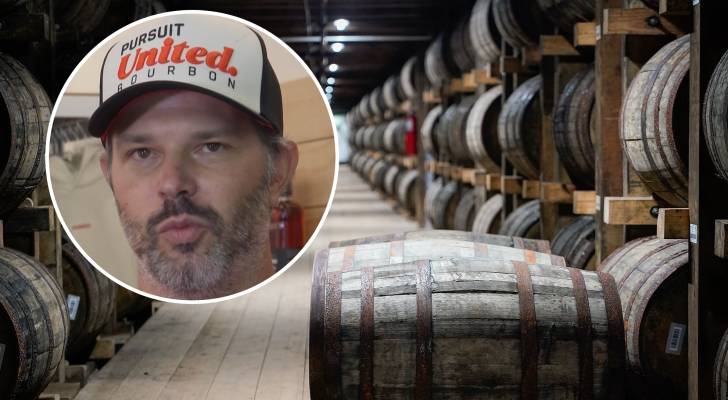
For years, bourbon drinkers stayed loyal to their favorite labels. But shifting consumer tastes and looming tariffs are starting to leak from a cracked pot.
Sales of Kentucky’s biggest brands are sliding, and new trade measures under the Trump administration are adding pressure.
Canada — once one of the biggest buyers of American booze — imported $1.1 billion worth of American spirits in 2023-2024. Now, in retaliation for the tariffs, Ontario, Quebec and Alberta have stopped purchasing U.S. alcohol.
For Ryan Cecil, a master blender at Louisville’s Pursuit Spirits, the impact is being felt industry-wide, but his boutique brand has somehow thrived in a niche domestic market. "We’re up 50 percent this year over last year," Cecil told WHAS11. "We’ve been insulated from all the tariffs. We’re here only domestically."
Must Read
- Thanks to Jeff Bezos, you can now become a landlord for as little as $100 — and no, you don’t have to deal with tenants or fix freezers. Here’s how
- I’m 49 years old and have nothing saved for retirement — what should I do? Don’t panic. Here are 6 of the easiest ways you can catch up (and fast)
- Dave Ramsey warns nearly 50% of Americans are making 1 big Social Security mistake — here’s what it is and 3 simple steps to fix it ASAP
When the barrel runs dry
Pursuit Spirits may be imbibing in the high — expanding from its Butchertown roots to a new tasting room in downtown Louisville — but not every distillery is enjoying the same trend. Larger distillers that lean into exporting are facing a harsh reality as global trade tensions cut into their bottom lines.
Reports reveal some of Kentucky’s most recognized brands are feeling the squeeze: Brown-Forman’s Woodford Reserve, Old Forester and Coopers’ Craft sales slipped 5%, Campari Group’s Wild Turkey fell 8% and Diageo’s Bulleit dropped 7%. Behind the numbers is the perfect brew — inventory left over from pandemic production surges, shifting consumer preferences and the combined economic sting of tariffs and inflation.
Even big names have stumbled. Kentucky Owl owner, Stoli Group USA, filed for Chapter 11 bankruptcy in November 2024, citing geopolitical tensions, tariff-driven headwinds and weaker demand for high-end bourbon.
"While people used to say, ‘Bulleit is my brand, Wild Turkey is my brand, or Jim Beam is my brand,’ and they would buy that exclusively, you kind of see the new drinker being more curious and [wanting] to explore different expressions from different distilleries — not just in Kentucky, but also across the U.S.," Cecil said.
Read more: This is how much US drivers saved on car insurance when they switched providers, according to a new Consumer Reports survey of 140,000 policyholders
Tariffs take the blame
Industry leaders have warned that tariffs could hurt American distillers. In a letter to President Donald Trump, 57 alcohol industry groups said a 15% U.S. tariff on European goods could cut alcohol sales by nearly $2 billion and threaten 25,000 American jobs.
The group, Toasts Not Tariffs Coalition — which represents major players like Diageo and Pernod Ricard alongside U.S. whiskey makers, wine producers, glass suppliers, retailers and restaurants — warned the effects would also be felt by the American market, not just overseas.
Kentucky Governor Andy Beshear told WHAS11 that the blame rests solely on tariffs.
"Bourbon might have had some corrections that were going to happen with supply, but when you see what’s happening in Canada and the EU and other places, we know it’s the tariffs," Beshear said.
Cecil says many distilleries are shifting their business models toward ready-to-drink cocktails, tapping into the growing popularity of canned beverages that compete with vodka seltzers. The trend has caught on with younger consumers, making it a promising market to explore as economic and trade pressures continue.
The shift also offers a broader lesson for any business: don’t rely on a single market. As distillers are discovering, dependence on one region or product can leave a company vulnerable. Diversifying revenue streams — whether through new product lines, targeting different customer segments or expanding online — can help cushion the blow when the market turns.
Whether it’s tariffs, supply chain disruptions or a decrease in demand, building financial reserves and having a contingency plan can make the difference in crafting the right brew.
What to read next
- How much cash do you plan to keep on hand after you retire? Here are 3 of the biggest reasons you’ll need a substantial stash of savings in retirement
- There’s still a 35% chance of a recession hitting the American economy this year — protect your retirement savings with these 5 essential money moves ASAP
- This tiny hot Costco item has skyrocketed 74% in price in under 2 years — but now the retail giant is restricting purchase. Here’s how to buy the coveted asset in bulk
- Want an extra $1,300,000 when you retire? Dave Ramsey says this 7-step plan ‘works every single time’ to kill debt, get rich in America — and that ‘anyone’ can do it
Join 200,000+ readers and get Moneywise’s best stories and exclusive interviews first — clear insights curated and delivered weekly. Subscribe now.
This article provides information only and should not be construed as advice. It is provided without warranty of any kind.